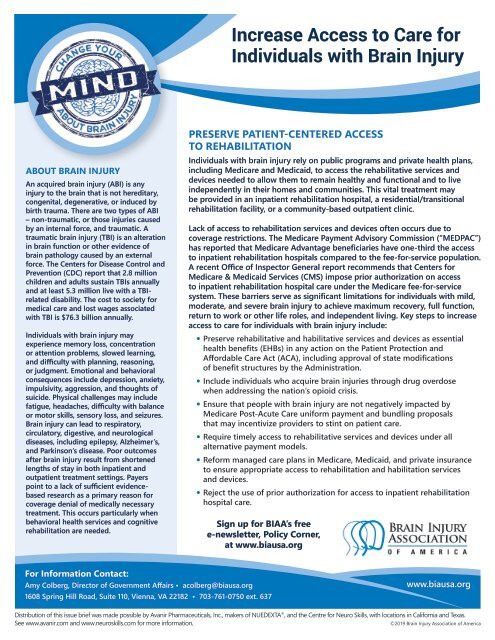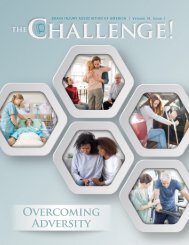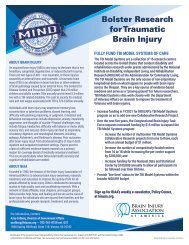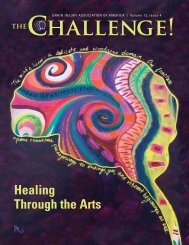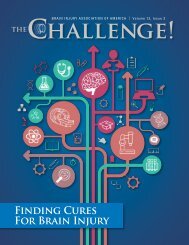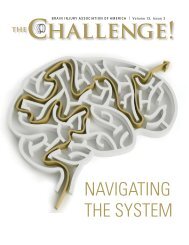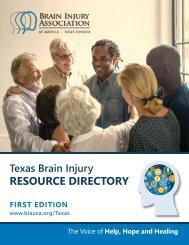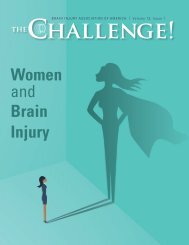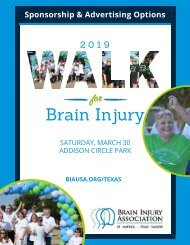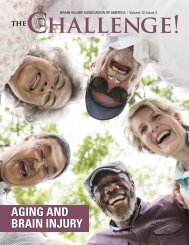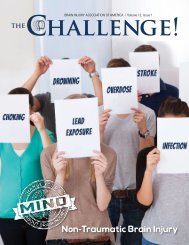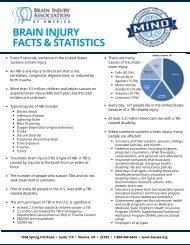2019 Brain Injury Association of America Legislative Issue Briefs
You also want an ePaper? Increase the reach of your titles
YUMPU automatically turns print PDFs into web optimized ePapers that Google loves.
Increase Access to Care for<br />
Individuals with <strong>Brain</strong> <strong>Injury</strong><br />
ABOUT BRAIN INJURY<br />
An acquired brain injury (ABI) is any<br />
injury to the brain that is not hereditary,<br />
congenital, degenerative, or induced by<br />
birth trauma. There are two types <strong>of</strong> ABI<br />
– non-traumatic, or those injuries caused<br />
by an internal force, and traumatic. A<br />
traumatic brain injury (TBI) is an alteration<br />
in brain function or other evidence <strong>of</strong><br />
brain pathology caused by an external<br />
force. The Centers for Disease Control and<br />
Prevention (CDC) report that 2.8 million<br />
children and adults sustain TBIs annually<br />
and at least 5.3 million live with a TBIrelated<br />
disability. The cost to society for<br />
medical care and lost wages associated<br />
with TBI is $76.3 billion annually.<br />
Individuals with brain injury may<br />
experience memory loss, concentration<br />
or attention problems, slowed learning,<br />
and difficulty with planning, reasoning,<br />
or judgment. Emotional and behavioral<br />
consequences include depression, anxiety,<br />
impulsivity, aggression, and thoughts <strong>of</strong><br />
suicide. Physical challenges may include<br />
fatigue, headaches, difficulty with balance<br />
or motor skills, sensory loss, and seizures.<br />
<strong>Brain</strong> injury can lead to respiratory,<br />
circulatory, digestive, and neurological<br />
diseases, including epilepsy, Alzheimer’s,<br />
and Parkinson’s disease. Poor outcomes<br />
after brain injury result from shortened<br />
lengths <strong>of</strong> stay in both inpatient and<br />
outpatient treatment settings. Payers<br />
point to a lack <strong>of</strong> sufficient evidencebased<br />
research as a primary reason for<br />
coverage denial <strong>of</strong> medically necessary<br />
treatment. This occurs particularly when<br />
behavioral health services and cognitive<br />
rehabilitation are needed.<br />
PRESERVE PATIENT-CENTERED ACCESS<br />
TO REHABILITATION<br />
Individuals with brain injury rely on public programs and private health plans,<br />
including Medicare and Medicaid, to access the rehabilitative services and<br />
devices needed to allow them to remain healthy and functional and to live<br />
independently in their homes and communities. This vital treatment may<br />
be provided in an inpatient rehabilitation hospital, a residential/transitional<br />
rehabilitation facility, or a community-based outpatient clinic.<br />
Lack <strong>of</strong> access to rehabilitation services and devices <strong>of</strong>ten occurs due to<br />
coverage restrictions. The Medicare Payment Advisory Commission (“MEDPAC”)<br />
has reported that Medicare Advantage beneficiaries have one-third the access<br />
to inpatient rehabilitation hospitals compared to the fee-for-service population.<br />
A recent Office <strong>of</strong> Inspector General report recommends that Centers for<br />
Medicare & Medicaid Services (CMS) impose prior authorization on access<br />
to inpatient rehabilitation hospital care under the Medicare fee-for-service<br />
system. These barriers serve as significant limitations for individuals with mild,<br />
moderate, and severe brain injury to achieve maximum recovery, full function,<br />
return to work or other life roles, and independent living. Key steps to increase<br />
access to care for individuals with brain injury include:<br />
• Preserve rehabilitative and habilitative services and devices as essential<br />
health benefits (EHBs) in any action on the Patient Protection and<br />
Affordable Care Act (ACA), including approval <strong>of</strong> state modifications<br />
<strong>of</strong> benefit structures by the Administration.<br />
• Include individuals who acquire brain injuries through drug overdose<br />
when addressing the nation’s opioid crisis.<br />
• Ensure that people with brain injury are not negatively impacted by<br />
Medicare Post-Acute Care uniform payment and bundling proposals<br />
that may incentivize providers to stint on patient care.<br />
• Require timely access to rehabilitative services and devices under all<br />
alternative payment models.<br />
• Reform managed care plans in Medicare, Medicaid, and private insurance<br />
to ensure appropriate access to rehabilitation and habilitation services<br />
and devices.<br />
• Reject the use <strong>of</strong> prior authorization for access to inpatient rehabilitation<br />
hospital care.<br />
Sign up for BIAA’s free<br />
e-newsletter, Policy Corner,<br />
at www.biausa.org<br />
For Information Contact:<br />
Amy Colberg, Director <strong>of</strong> Government Affairs • acolberg@biausa.org<br />
1608 Spring Hill Road, Suite 110, Vienna, VA 22182 • 703-761-0750 ext. 637<br />
www.biausa.org<br />
Distribution <strong>of</strong> this issue brief was made possible by Avanir Pharmaceuticals, Inc., makers <strong>of</strong> NUEDEXTA ® , and the Centre for Neuro Skills, with locations in California and Texas.<br />
See www.avanir.com and www.neuroskills.com for more information.<br />
©<strong>2019</strong> <strong>Brain</strong> <strong>Injury</strong> <strong>Association</strong> <strong>of</strong> <strong>America</strong>


